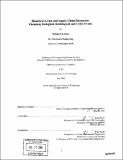Historical events and supply chain disruption : chemical, biological, radiological and cyber events
Author(s)
Lensing, Reshma P. (Reshma Pradhan), 1972-
DownloadFull printable version (10.27Mb)
Other Contributors
Massachusetts Institute of Technology. Engineering Systems Division.
Advisor
Yossi Sheffi.
Terms of use
Metadata
Show full item recordAbstract
In the wake of the attacks of September 11, 2001, terrorism emerged as a legitimate threat not just to society, but to corporations as well. This new threat has challenged old business rules and prompted companies to rethink their supply chain operations. However, the events of September 11th were not the first or the only disruptions that the business world had experienced. This thesis reviews past historical events that simulate the effects of a terrorist attack and extracts lessons that can be applied by today's corporations to prepare for future attacks or disruptions. The types of events studied include Biological, Chemical, Radiological and Cyber disruptions. Through the analysis and synthesis of each event's impact, the following generalized recommendations emerged: Prior warnings and events should be acknowledged, studied and utilized. Government intervention may strain operations under disruptive stress. Alternate sourcing should be considered to ease supply issues. Disruptions should be approached in a comprehensive and forthright manner. A security and safety culture should be fostered to prevent disruptions and control their spread. Systems should be prepared to quickly operate in isolation during a disruption. Finally, impact is frequently less severe then initially predicted. Through the events described and these recommendations, this thesis aims to provide lessons for firms to manage their supply chains through future disruptions.
Description
Thesis (M. Eng. in Logistics)--Massachusetts Institute of Technology, Engineering Systems Division, 2003. Includes bibliographical references (leaves 98-113).
Date issued
2003Department
Massachusetts Institute of Technology. Engineering Systems DivisionPublisher
Massachusetts Institute of Technology
Keywords
Engineering Systems Division.